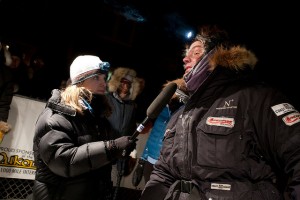SNRAS graduate student loses sleep, finds adventure on Yukon Quest Trail
March 2, 2011

907-474-5042
3/2/11
A graduate student in the UAF School of Natural Resources and Agricultural Sciences recently concluded the “incredible adventure” of reporting along the Yukon Quest trail for KUAC-FM, a public radio station operated by the University of Alaska Fairbanks.
The 1,000-mile, grueling sled dog race has long attracted Emily Schwing’s attention. She has dreamed of covering the event for years and finally made it come true. “It was an opportunity I asked for and got,” she said. “I learned so much about dog mushing.”
Prior to the race in February 2011, Schwing had barely been exposed to the world of mushing. After spending days on the trail with yipping, energetic, loyal dogs, she decided adopting a husky as a pet might be in her future.
“I learned about the people who mush,” she said. “I learned big character lessons and I got to see parts of Alaska that not many people see. “I would not trade this experience for anything.”
Schwing, who grew up in Utah, got her start in radio by volunteering at a public radio station in Salt Lake City. She had taken time off from school at Carleton College to be a ski bum, but her father had other ideas. “Dad said I had to do something, so I went to the local public radio station to stuff envelopes; fifteen minutes later I was an intern. I even got to interview Walter Cronkite.”
Thanks to her dad, Schwing found her niche. She made it even more hers when she began focusing on science reporting at the public radio station in Petersburg and for Deutsche Welle in Germany. When Schwing decided to pursue a master’s degree to help her understand science she chose SNRAS’s forest sciences program. Her research focuses on carbon balance in the deciduous boreal forest.
“People don’t realize their whole lives are touched by science every day,” Schwing said. “So much science goes into life. But science can be daunting. Being a scientist is cool but to educate people in science is even cooler.”
On the Yukon Quest trail, Schwing was along for the food drops prior to the race, was in the starting chute in Whitehorse, worked most checkpoints, and saw it all to the end on the Chena River in downtown Fairbanks. Along the way she got stuck on Eagle Summit, endured challenging weather (52 below zero), and had the time of her life. “It was not stressful but it was emotional,” she recalled. “Everyone was super sleep deprived.”
And she lost eight pounds. “I don’t know how,” she joked, explaining that she found a new snack along the trail that one of the handlers insisted she try: candied bacon. “It’s awesome,” Schwing praised. “It’s like a cross between bacon and cinnamon rolls.” The story she posted about the novelty food was one of the most popular among her listeners.
Overall, Schwing said she will always remember the race and will cover it in the future if possible. “I made good friends who are extremely interesting people. This is an incredibly unique race. The challenge is beyond most people.”
Mushers, she said, have the strength and fortitude to push themselves on the race. “That’s what I will remember. They are pretty cool. And the dogs are truly athletes. They are so willing to serve their humans.”
Schwing found the perfect medium in radio. She is not interested in television or newspapers but she has her own blog.
She credits her parents with being her biggest fans. “They think I’m crazy but they love it. They are the best family.”
In her spare time Schwing loves telemarking in Utah or cross-country skiing in Alaska. She plans to be at the White Mountains 100 in March. Previously she has covered the race as a reporter, but this time will be a participant. Her goal in the race? Simply to finish.
Schwing’s advisor, professor Dave Valentine, would like to encourage more students to combine journalism and science. “A key focus of the university is improving science literacy and getting more scientific journalists would be a wonderful thing,” he said.


